The use of renewable fuels such as hydrotreated vegetable oil (HVO) to cut carbon emissions from diesel trucks now rather than waiting for battery electric vehicles to develop into a more practical solution is becoming increasingly popular.
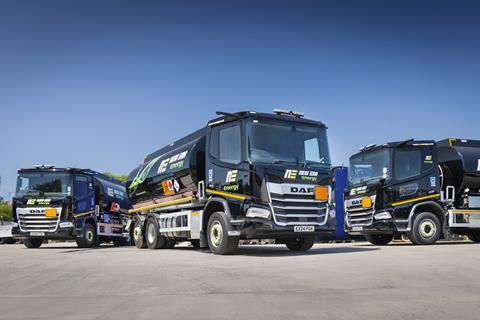
Prominent companies in the haulage industry and major supermarket chains are adopting HVO, demonstrating that it is a clean and reliable fuel, vastly improved from the days when biodiesel made from fatty acid methyl esters (FAME) caused issues with algae and clogged fuel filters.
New Era, originally established in Stratford, East London as a distributor of oils and lubricants, has significantly expanded its fuel business. Currently, the company manages over 250 million litres of fuel annually for on and off road use.
CEO James Hunt, who joined New Era in 1997 when it was mainly a lubricants supplier, explains the company’s evolution.
“We’ve shifted our focus to fuel over the years,” he says. “Back then, we operated from a single depot in Stratford with a small 5,000-litre tanker. In 2004, we moved to Harlow and began receiving more enquiries about red diesel. We started delivering to small construction sites across London, and as demand for fuel grew, so did our business.”
From its modest beginnings with one tanker, New Era’s fleet has expanded significantly, achieving FORS Gold accreditation. This certification highlights the company’s dedication to safety, reliability, and superior service, reflecting its core brand values.
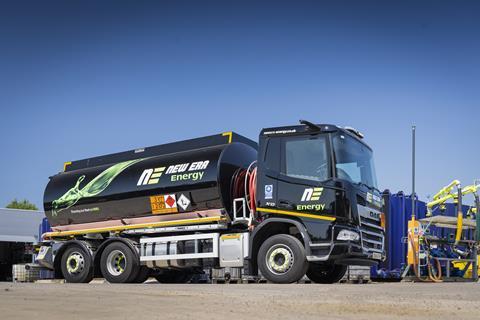
“Our fleet now consists of 69 rigid tankers, three urban trailers, 10 artic trailers and 12 flatbeds,” says Hunt. “We have another 10 rigid tankers on order, which will be integrated into our fleet throughout the year.
“We also a small fleet of vans and 4x4s which distribute our box products, lubricants and emergency bulk fuel.
95% of our fleet are DAF trucks, reflecting a robust and successful partnership that has spanned over 20 years, thanks to our strong relationships with Phil Moon [DAF Trucks marketing manager] and Gary Carpenter (MD of Harris DAF Grays].”
“We practice what we preach, using HVO across our entire fleet,” continues Hunt. “We consume around 1 million litres of HVO annually as road fuel, which we’ve hedged for our fleet. This is a significant expense for the business, but it aligns with our core sustainability value. HVO is a premium product that provides an immediate CO2 reduction of up to 90%.
“We recognise the cost difference. If we ran our fleet on white diesel, especially with recent price drops, the company would benefit financially. But delivering a renewable product using fossil fuels would contradict our commitment to sustainability.”
It is this price premium over DERV that puts off many operators – especially hauliers who can often struggle to pass on higher costs to their customers – from using HVO. But by hedging, New Era can offer customers fixed price contracts a year or more ahead, making budgeting for fuel costs easier (see panel).
“Every New Era depot now stores HVO, resulting in the largest depot network of HVO within the UK,” says Hunt. “Since 2020, when we sold just 500,000 litres, we have made remarkable progress. This year, we are on track to distribute 60 million litres of HVO fuel.
“We can support this growth by offering a smart tank solution on site, which helps customers further decarbonise and track CO2e savings in real time. It also enhances our efficiency, reducing delivery frequency; for instance, a recent customer has moved from three deliveries a week to just one. This approach benefits both our customers and New Era by lowering our overall carbon footprint. This is the vision guiding our future.”
Two of the original founders of the business are now semi-retired and decided to sell their shares to Hanover Investors, a London-based private equity firm, in February 2024. Despite the government’s policy to start phasing out new diesel truck sales from 2035, Hanover recognises the long-term potential of HVO distribution as a viable business. This strategic move aligns with Hanover’s values and vision, reflecting a shared commitment to the future of sustainable transport.
“I can’t predict where technology will take us in the next decade. It is possible we might see batteries the size of a matchbox capable of powering a 40-tonne truck, or breakthroughs in synthetic liquid fuels that serve as sustainable, direct replacements for diesel,” says Hunt. “We believe that the future will likely involve liquid fuels as lower-carbon alternatives for the construction industry in particular however different sectors will require tailored solutions, so aligning with existing infrastructure will be crucial.
“We view HVO as a transitional fuel and the most viable sustainable option available today. The product we bring into the UK is ISCC certified, ensuring its sustainability credentials.”
The International Sustainability and Carbon Certification (ISCC) is an “independent multi-stakeholder initiative and leading certification system supporting sustainable, fully traceable, deforestation-free and climate-friendly supply chains” which guarantees that only waste products are used to make certified HVO. New Era has also signed up to the Zemo Partnership’s Renewable Fuels Assurance Scheme which “verifies claims made by companies supplying renewable fuels to heavy duty vehicle and equipment operators regarding their product’s GHG emission savings and provenance of raw material feedstocks”.
New Era sales director John David says: “This allows our customers to feel comfortable that we’ve delivered what we said we’ve delivered and here’s an independent audit to prove it.
“We recently rebranded from New Era Fuels to New Era Energy to better reflect our commitment to guiding customers through their sustainability journey and positioning ourselves as a consultative partner in providing sustainable solutions. While HVO effectively addresses immediate needs, we’re prepared to explore alternative solutions as they become viable in the future. HVO serves as our initial touchpoint to engage with customers and begin meaningful discussions about their long-term decarbonisation needs.”
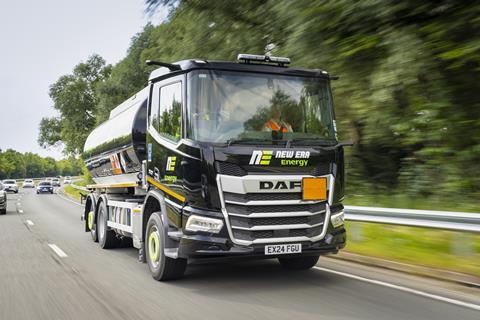
Hunt agrees, saying: “There’ll be certain industries like home delivery that will turn to electric vehicles. But I think that’s quite a few years away and I do believe a sustainable liquid fuel like HVO will be a stepping stone.”
At present the only way to get HVO is to put it into on-site bunkers, and New Era will install a tank for any customer who signs up to take at least 50,000 litres on a 12-month contract. It is also talking to some of the fuel card companies about putting HVO tanks and pumps on larger forecourts in logistics hotspots such as Lutterworth and is looking at opening up its depot network to allow operators to refuel vehicles there.
“We fill our own trucks with HVO so we have the refueling facilities on all our sites,” says Hunt. “With the equipment we have, we can set up our own fuel card for customers so their drivers can come in, enter a PIN and dispense fuel from any of our depots.”
These are currently located in Plymouth, Oxford, Wembley, Gatwick, Harlow, Grays, Peterborough, Cambridge, Norfolk and Ipswich.
The beauty of the product is that if a customer’s vehicle goes out with a full tank of HVO and can’t return to base to refuel with HVO, the driver can simply top up with DERV as the two products are completely compatible. As the fuels can blend this helps some customers phase out the use of solely transitioning to using only HVO.
“If you’re trunking overnight you can start off on HVO and when you get to the destination you may have to fill up using a fuel card at a forecourt,” says David. “If they haven’t got HVO at least you’ve decarbonised half your journey.”
If you fill up with DERV you are using FAME
Despite the past problems of waxing and condensation with FAME, it is in theory blended into every litre of DERV sold in the UK. Under the Renewable Transport Fuels Obligation (RTFO) standard diesel for road vehicles is now a B7 blend, meaning it should contain 7% biodiesel, although under a complex system of credits, suppliers can buy certificates if they cannot or do not want to source enough biodiesel to achieve the 7%.
The plan was to steadily increase the biodiesel content and go to B9 but in northern areas of the UK this could have caused waxing and blocked fuel filters. This is because FAME is the preferred bio content for B7 rather than HVO which does not cause waxing, simply because it is cheaper.
“I think they were transitioning to 9% but in colder parts of the UK like Scotland they had major issues a few years ago because it got really cold,” says Hunt. “Lots of filters got blocked and we sent our engineers to Scotland to support our customers within the agriculture sector in changing or cleaning filters.”
New Era has produced a myth-buster document that aims to overcome the many misconceptions around HVO which many operators still confuse with FAME and reinforce the fact that HVO is a cleaner fuel and does not block filters.
So how much is HVO?
While HVO is undoubtedly more expensive than DERV, that price differential varies depending on the price of HVO an operator agrees with its supplier and the price of DERV which fluctuates more or less in line with oil prices.
The cost of producing HVO at the refinery is closely linked to the price of the feedstock, which is mainly used cooking oil sourced from around the world. It is possible to reduce the price by using a proportion of cheaper feedstocks such as animal fats at the refinery but that will reduce the carbon emissions saving which can be as much as 90% with cooking oil.
For simplicity some suppliers will set the price of HVO as a premium over the Platts price index for B7 DERV.
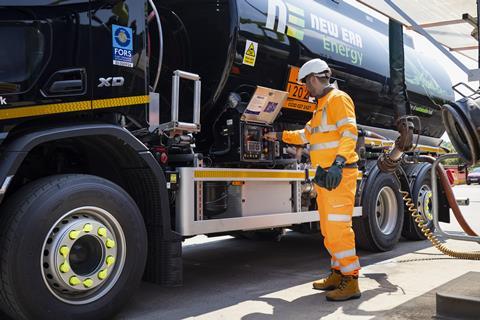
“If you want that, that’s fine,” says David. “That way, I know that I’m safe, I’ve got no risk. We have traded in that way in the past but it means customers are paying a lot more than DERV. Instead now we just hedge the entire process and that really does help our clients budget because if they commit to a volume we guarantee the price will stay the same for 12 months. It also ensures security of the product.
“That really does work. In the construction industry, for example, it means you can budget for your projects. If you think you’re going to use a million litres of fuel for your groundworks for 500 homes, you can fix your pricing.”
Hunt goes on: “Hauliers too can benefit from fixed prices for a certain litreage and it just means it doesn’t matter what happens in the world. We fix everything at that point so it’s a guaranteed delivered cost to you. The only thing that could affect that is if the duty went up, but that would affect everything.
“Yes it is more expensive but it depends on your location, drop size and so on and the premium often isn’t as much as people think. And because it is a cleaner fuel, there is less maintenance and downtime, and the DPF does not have to do forced regenerations in stop-start traffic. Being efficient can save money”
“There are a lot of benefits that outweigh the higher pence per litre.”
Because HVO is delivered by New Era’s road tankers it has to go into operators’ on-site bunkers and as it is a straight drop-in replacement for DERV customers can switch all or just some of their sites to the renewable fuel, sometimes on a back-to-back agreement to contribute to the cost with certain customers.
Growing pressure from more environmentally-aware customers means that having a net zero plan with stepping stones like renewable fuels is a pre-requisite for tendering. Many large infrastructure projects now mandate the use of Hydrotreated Vegetable Oil (HVO) on certain projects and encourage the adoption of other renewable products. This trend helps contractors enhance their chances of winning future work.
HVO is a cleaner fuel says DAF Trucks
Because HVO is made exclusively from waste – mainly used cooking oil – it delivers around a 90% saving on well to wheel carbon emissions over fossil diesel. But it also burns cleaner, reducing maintenance, fuel consumption and the use of AdBlue.
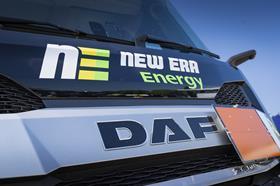
Every New Generation DAF diesel is able to run on 100% HVO with no modifications and a DAF spokesperson says: “The use of HVO, which has less aromatics and burns cleaner than fossil diesel, reduces emissions of soot, thus allowing the diesel particulate filter (DPF) to stay cleaner for longer. The knock-on benefit of this is the reduction in fuel used to burn off the soot through regeneration of the DPF.
“Another benefit is lower AdBlue use. This is because HVO contains lower levels of oxygen which contributes to the formation of NOx during combustion.”














